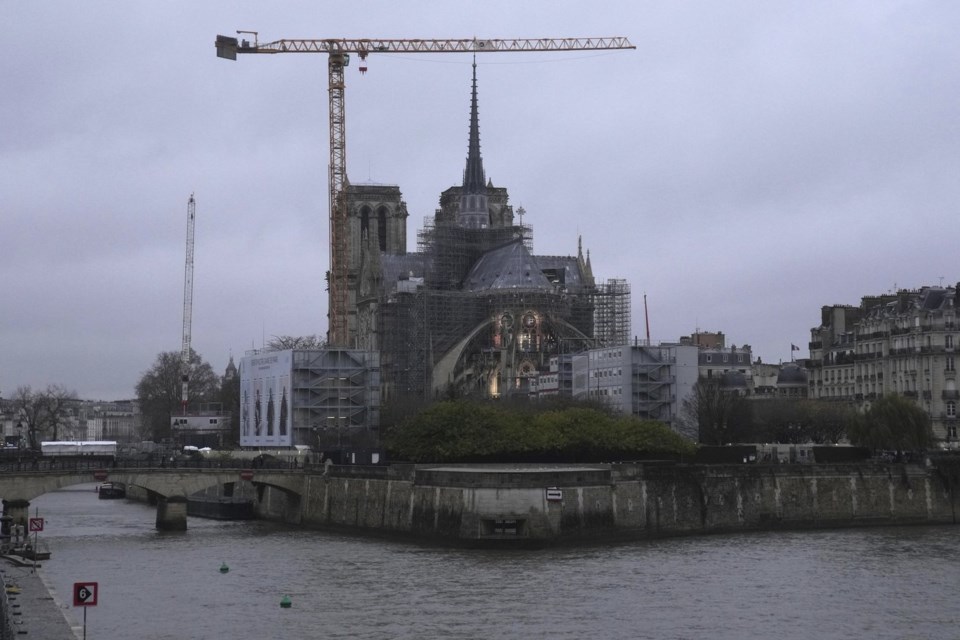MONTREAL — Five years ago, Notre-Dame Cathedral erupted in flames. A column of smoke rose above the Paris skyline as the historic cathedral, which took 182 years to build between the 12th and 14th centuries, was reduced to a smouldering shell.
Yet against all odds, the Gothic masterpiece is reopening its doors on Saturday — and two Canadian blacksmiths played a role in its restoration.
Montreal blacksmith Mathieu Collette won’t be able to make it to Paris to see the resurrected church before the summer, but he said he is grateful for his small part in the cathedral's history. “I believe I have a little place in paradise now,” he said in an interview Thursday.
After Notre-Dame fell into ruin, Collette got a call from a fellow blacksmith working in the Alsace region of France, asking if he wanted to fly to Europe to get involved in the Notre-Dame rebuild.
Over four months in the fall of 2022, Collette and a team of seven young blacksmiths under his direction forged three different types of axe — 60 axes altogether. The axes were quickly distributed to carpenters who needed the tools to carve the roof’s timber frame, doing their best to mimic the original construction.
Collette said experts are able to look at stone, wood and other materials and determine the tool that was originally used. In the case of the frame Collette was helping with, it was determined that three different kinds of axe had been used.
“Every time an axe was finished, the axe was sent to the carpenter," he said. "We never had a chance to look at more than two, three finished axes at the same time, because we were eight people forging as many axes as possible every day."
Collette, 49, has been working as a blacksmith for more than 30 years. In 1994, he moved to southwest France to apprentice under master blacksmiths, returning to Quebec in 1998. He soon opened his own foundry with the help of his father. Over the years, he has visited Notre-Dame several times, stopping to marvel at its "incredible" door hinges.
“Every blacksmith in the world asks themselves, ‘How is it possible to do that?’” he said in an interview.
Another Canadian blacksmith, Nicholas Erb from Toronto, was also involved in the project, though Collette said he never crossed paths with Erb.
The day after the cathedral burned in April 2019, French President Emmanuel Macron decreed that Notre-Dame would rise again in just five years — a deadline that at first even daunted the chief architect behind of the rebuild, Philippe Villeneuve.
Macron’s decree became the driving force behind the most prominent restoration in modern French history. The announcement sparked unprecedented global support, with donations quickly nearing $1 billion.
“I will just lift my hat to them and say everything went right and on time," Collette said. "This is incredible."
A month after the fire, Prime Minister Justin Trudeau visited Paris and offered Canadian steel and lumber to France to help with the restoration.
"Canada will stand with France and ensure we offer all the support — whether it's steel or wood or whatever help we can," Trudeau said. "This is truly a piece — not just of French history — but of world history that needs to be preserved, and we will be there to be part of it."
On Thursday, federal government officials were not able to confirm whether Canada ultimately provided any material to contribute to the rebuild.
The reopening kicks off with invite-only ceremonies on Saturday and Sunday, with heads of state and government — including Quebec Premier François Legault — descending on the French capital. Security measures will be tight with the cathedral's island location sealed off to tourists.
This report by The Canadian Press was first published Dec. 6, 2024.
— With files from The Associated Press
Joe Bongiorno, The Canadian Press



